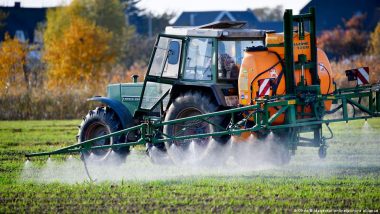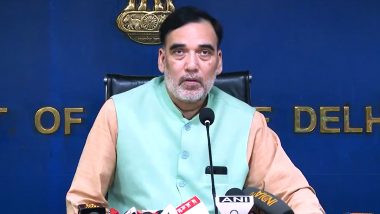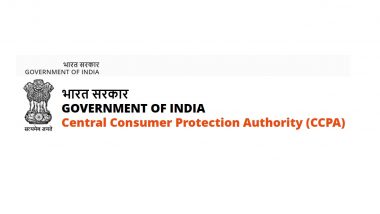It remains the world's best-selling herbicide, despite potentially causing cancer in humans. As EU approval for use of the chemical glyphosate is set to end, some are lobbying for an extension.Approval in the EU for the controversial weed killer glyphosate, long manufactured under the name Roundup, will lapse this December unless member states agree to a re-authorization.
Also Read | Business News | Introducing Patra Travels: A Game Changer in the Travel Industry.
On September 15 and 22, debate on whether to extend the approval will take place among the European Commission and member states in the Standing Committee on Plants, Animals, Food and Feed (SCoPAFF). A vote is expected on October 12.
Also Read | India News | Delhi Court Seeks ED Response on Bail Plea of ‘conman’ Sanjay Prakash Rai.
The German Ministry of Agriculture said the renewal was "not justified." Meanwhile, Greenpeace on Thursday referred to a leaked document that revealed "the European Commission's eagerness" to re-authorize glyphosate, saying this was despite the herbicide's "negative effects on human health and the environment.
What is glyphosate?
The US chemical company Monsanto used glyphosate, a mixture of the organic phosphorus compound with other substances, to create the weed-killer Roundup, which it first distributed in 1974.
Farmers around the world continue to spray their fields with the herbicide to kill off green weeds before a crop is sown. The chemical spray also inhibits the growth of weeds that can outcompete crops while they are growing.
Pesticides containing glyphosate are now manufactured by several dozen chemical companies worldwide. Germany's Bayer AG acquired Monsanto, including its top-selling product Roundup, in 2018 and maintains "a leading position" in the herbicides market, Bayer press spokesman Utz Klages told DW.
What is the problem with glyphosate?
Killing wild weeds and plants on agricultural fields deprives insects of their habitat. This in turn deprives birds of food.
"The herbicide destroys the nutritional basis for animals," Jörn Wogram, head of the pesticide department at Germany's Federal Environment Agency, told DW. "Thus glyphosate, along with other pesticides, threatens biodiversity," he added.
However, according to studies, glyphosate-based sprays might also alter genetic material, and impact the nervous system in animals and humans. A study by the University of Ulm, for example, found massive malformations in tadpoles, with disorders of the brain, heart, eyes and body shape due to exposure to the herbicide.
Since the toxin is spread through the air when sprayed on fields, it contaminates widely, from surface water and groundwater through to agricultural produce. Traces have been found in human urine and breast milk.
Pesticides containing glyphosate are sprayed in large quantities in soy production, for example — including the genetically-modified soy seeds created by Monsanto to be resistant to Roundup. Health consequences include a higher risk of cancer within farming communities.
"We can see very clearly that people are getting sicker from glyphosate," said Medardo Avila Vazquez, a physician at the University Hospital of Maternity and Neonatology in Cordoba, Argentina. "In certain rural areas, they are three times more likely to have cancer," added the co-author of studies on the health impacts of glyphosate on agricultural populations.
The use of glyphosate in soybean-growing areas increased the number of miscarriages by a factor of between two and three, Avila Vazquez told DW. Meanwhile, damage to genetic material "quadrupled the number of malformations," he added.
Cancer researcher Luoping Zhang of the University of Berkeley in California has evaluated the link between glyphosate and types of lymphoma including non-Hodgkin's lymphoma.
"People exposed to glyphosate or glyphosate-based herbicides have a 41% higher risk of developing non-Hodgkin's lymphoma," Zhang told DW of one study.
Other independent studies show that glyphosate can damage the nervous system, leading to Parkinson's disease. The herbicide also damages microorganisms, changing the vital composition of gut bacteria that are vital for human health.
How are the cancer research agency and regulatory authorities responding?
In 2015, the International Agency for Research on Cancer (IARC) concluded on the basis of independent and published studies that glyphosate is probably carcinogenic.
But the national authorities who are responsible for approving glyphosate rely almost exclusively on research provided by pesticide manufacturers. These studies are not public, have not been independently verified, and have been criticized by scientists.
By contrast, the European Food Safety Authority (EFSA) released an assessment in July stating it could not identify "critical areas of concern" concerning the the impact of glyphosate on the health of humans, animals and the environment. While acknowledging that it could not make a comprehensive evaluation due to "data gaps," it did recommend that glyphosate be considered for EU re-authorization.
"Pesticide producers withheld studies on neurotoxicity in the EU authorization procedure," stated toxicologist Peter Clausing of the Pesticide Action Network in regard to the EFSA assessment. The process is marked by "unacceptable secrecy," he added.
For toxicologists, health experts, environmentalists and some farmers, the lapse of approval in the EU would be a win for the environment and human health.
Such a progressive change must be backed with broad agricultural reforms, said Clausing. "As a unilateral, isolated measure, a glyphosate ban would have the potential to exacerbate the crisis in conventional agriculture," he said.
Farmers should be also better supported to adopt sustainable farming techniques, for example.
"Organic farming shows that farming without herbicides, such as glyphosate, is quite possible and has developed numerous innovations on how to farm well without them," said Saskia Horenburg of the German Federation of the Organic Food Industry.
Measures include the introduction of new cereal varieties that produce shade with their leaves and thus "suppress" weed growth, Horenburg explained.
What would the re-authorization of glyphosate mean?
The continued use of glyphosate and other herbicides "jeopardizes the achievement of sustainability goals related to environmental protection," says Jörn Wogram of the German Federal Environment Agency.
For the countries of the Global South, too, the EU decision "undoubtedly has enormous significance," said Larissa Mies Bombardi, who conducts research on the consequences of pesticides in Brazil.
If Europe itself were to ban the spraying of glyphosate, she believes this would have a major signal effect for Brazil and other countries.
Pesticide can be more easily sold when EU authorities claim that environmental and health problems are not a major concern. This would change with a ban.
"The European Union can take the first step by eliminating pollutants and making sure that the rules on its territory can be extended to the world," said Mies Bombardi.
This article was originally published in German.
(The above story first appeared on LatestLY on Sep 15, 2023 07:20 PM IST. For more news and updates on politics, world, sports, entertainment and lifestyle, log on to our website latestly.com).













 Quickly
Quickly



















